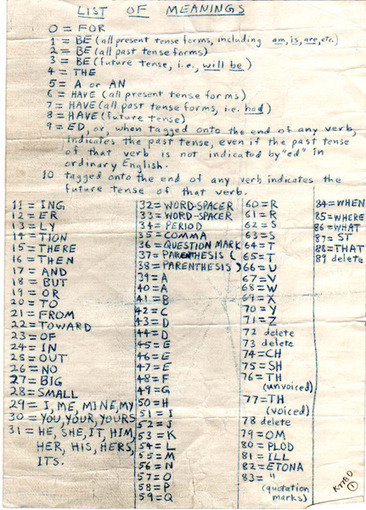James Benning
dal 5/3/2014 al 31/5/2014
Segnalato da
5/3/2014
James Benning
Kunsthaus Graz am Landesmuseum Joanneum, Graz
Decoding Fear. Interwoven with a wide variety of objects, replicas and picturesque or typographical reproductions which Benning has copied meticulously from models found in the Kaczynski hut-the overview of films, objects and installations.

curated by Peter Pakesch
With James Benning, the Kunsthaus Graz continues its exploration of moving images in space.
The artist and film maker James Benning (born in 1942 in Milwaukee, Wisconsin; lives in Val Verde, California) is a careful observer. His films, which track the extraordinary in daily life using long shots, are marked by precision and calm, offering views of (American) modes of life, landscapes, as well as natural and human phenomena. James Benning's role is that of eye-witness. His observations would seem almost documentary-like were it not for the mathematical precision that becomes clear when we examine his films. The image detail—mostly from a central perspective—is always perfectly balanced, the play between image and soundtrack is exact, the motive captured at the right moment by the camera.
Benning harbours a guarded enthusiasm for technology; before becoming an artist, he studied mathematics, an influence on his thinking to the present day. Hence it would miss the mark entirely to reduce him to the filming of poetic landscapes. Benning's fascination with nature is not limited to its primitiveness; rather it is human intervention that makes landscape pictures especially interesting for him. Criticism of the practices of the information society can be heard here, likewise the involvement with myths which show themselves not least of all in figures from recent American history. Specifically, there are two 'dropouts' who form the starting point for Benning's projects, Two Cabins (2011) and Stemple Pass (2012): the writer and philosopher Henry David Thoreau (1817–1862) and the mathematician Theodor Kaczynski, known between 1976 and 1998 as the 'Unabomber.' As different as the philosophies and outlooks on life of these two may seem at first glance, certain commonalities are also apparent, which are not confined to a (in the case of Thoreau more or less) withdrawn life lived in simple, isolated and self-constructed huts in woods. Thoreau's call for civil disobedience is linked to his own person in a non-violent, exclusive manner, yet his criticism of technological developments and their consequences, his reformist ideas and concomitant life as a recluse (at least sporadically) was a clear model for the bomb planter Kaczynski, who according to a biography of mental resistance had made a point of putting a stop to technological progress through targeted acts of terror and the attention thereby gained for his manifesto. And once again James Benning seems to have taken on an observing role: he reflects the attitudes of protagonists, literally adopting their perspectives (i.e. the perspectives from the windows of both huts), without thereby casting judgement or taking a clear stance.
Interwoven with a wide variety of objects, replicas and picturesque or typographical reproductions which Benning has copied meticulously from models found in the Kaczynski hut—the overview of films, objects and installations offers a story which is presented in juxtaposed pairs and can similarly be read ambivalently. On another level the omnipresent networking of new technologies, more and more taking place in our unconscious, producing unstoppable glass humans and revealing a flood of information about ourselves to intelligence agencies as much as to industry, experiences a metaphorical analogy in the form of Benning's railway trains, which, as Thoreau correctly depicted, were the first to render the world controllable in a physically synchronised way, and thus space and time, too, in a manner unprecedented at the time.
Press contact:
Telephone +43-316/8017-9211 presse@museum-joanneum.at
Opening 6.03.2014, 07:00 PM
Kunsthaus Graz, Space02
Lendkai 1 - 8020 - Graz
Hours: Tuesday–Sunday 10am–5pm



